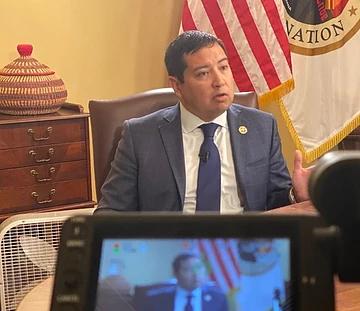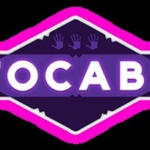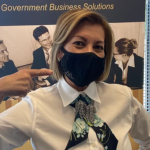As a part of our ongoing efforts to learn more about tribes and tribally owned businesses across the United States, our team recently traveled to Louisiana to learn more about the Coushatta Tribe. We will share more of our visit in the near future, but in the meantime we asked Tribal Chairman David Sickey a few questions about the tribe, its history, its resort-casino, and how COVID-19 has affected economic development for the tribe. As Chairman Sickey said “The Coushatta Tribe of Louisiana will continue to adapt, innovate, and progress toward the best life possible for all its tribal members, their families, and our neighbors.”
Tell us a little bit about yourself and the Coushatta tribe?
I became the Tribal Chairman of the Coushatta Tribe of Louisiana in June of 2017, after getting encouragement and support from family and Tribal members. This distinguished position followed my long history of public service committed to the leadership and economic progress of the Tribe. I began my professional contributions to the tribe in 2003 and was formally elected Vice Chairman in 2004. I’ve also served in other leadership roles within the Tribal Council and worked to restructure and strengthen the tribe’s government programs, sovereignty, and economic development.
In all the years between and during the leadership changes, I’ve taken every step forward with the help, respect, and honor of my Ancestors and Elders before me. My goal has always prioritized progression, which reflects the benefit of and best life possible for our nearly 1,000-member Tribe, over 2,500 employees, and the surrounding communities. I am grateful for my fellow elected community leaders, my family, and Our Creator’s hand in my life, culture, and history; my failures bear the same life lessons the Elders praise–the struggle makes us stronger.
The Coushatta Tribe of Louisiana is a Native American Tribe consisting of Seven Clans; one of four federally recognized tribes in Louisiana. In the beginning of the 20th century, Coushatta leaders began to formally engage the United States government, which extended funding to Coushatta children and contract medical care. In 1953, the relationship soured between the Coushatta and the federal government when, despite earlier treaties, the Bureau of Indian Affairs terminated all services to the community without Congressional approval or community consent. Efforts to regain federal recognition began in 1965. In 1972 the Louisiana Legislature granted the Coushatta official recognition. On June 27th, 1973, the Coushatta Tribe of Louisiana, under Tribal Chairman Ernest Sickey, once again received federal recognition from the Secretary of Interior.
After regaining federal recognition, the Coushatta Tribe began a variety of enterprises to provide revenue and jobs for our members. The Coushatta Tribe now owns approximately 5,000 acres of land in Allen Parish, Louisiana and an additional 1,000 acres in surrounding parishes. The land is used for tribal housing, rice and crawfish farming, and business programs, as well as, Tribal Government and Tribal Finance Departments; a Tribal Police Department; and Community, Health and Learning centers.
Despite the struggles the Coushatta have faced, the Tribe has maintained our unique culture, traditional crafts, and retain our spoken language to the present day. “Koasati” is the name of the Coushatta language and people. The Coushatta tribe is also distinguished world-wide for their masterful cane-woven and longleaf pine-needle basketry.
Can you tell us a bit about the Coushatta Casino & Resort as well?
After regaining federal recognition in 1973, the Coushatta Tribe began the work which helped plan, build, and finally open the award-winning Coushatta Casino Resort in 1995 as a premier land-based Louisiana casino. True to our tribe’s long history of hospitality, the casino-resort has continued to expand and improve in both size and service. Today, it features a 100,000 square foot gaming floor, luxurious hotel rooms, a luxury RV resort, fabulous restaurants, live entertainment and more. The entire operation has grown into the one of the top-ten largest employers in the state of Louisiana—responsible for almost 70% of the total workforce in Allen Parish—with charitable donations exceeding $120,000 in recent years.
Donations raised by Casino employees support the St. Nicholas Center, the Louisiana Lupus Foundation, the Melissa Doise Hope for a Miracle Foundation, the St. Jude’s Children’s Hospital, and the Vets for Kids Christmas Toy Drive. The Casino, in 2018 and 2019, also raised over $140,000 for the Chairman’s Cup Foundation, a 501(c)(3) non-profit charitable organization. Our tribe’s goal in developing tribal businesses has always been to generate the revenue necessary to operate the Tribal government, create jobs for Tribal members and the surrounding communities, as well as have a positive economic and social impact.
Tribes nationwide have had to shutter casinos due to COVID-19. How did the pandemic affect both the casino operations and the tribe itself?
The worldwide shutdown of business and daily life due to COVID-19 continues to impact the nationwide economy. The Coushatta Casino Resort had to temporarily close on March 16th through May 20th, 2020 and resulted in operations generating zero revenue for 65 days. The massive loss of revenue from the casino influences crucial sustenance funds for our Tribe and tribal members as well as income, resources, and necessary benefits for nearly 2,500 associates and employees.
The Coushatta Casino Resort was able to successfully reopen on May 20, 2020, while accommodating COVID-19 restrictions. This meant 25% of our machines were operational with only about 50% of the gaming positions. Even with current, careful phase planning, current restrictions ensure the Casino retains 50% of its maximum occupancy and 75% of all gaming positions. All of the casino’s more social and family centered entertainment operations such as our nightclub, Pavilion, and Dream Pool remain closed to the public. With the imposed limitations due to COVID-19, in addition to the significant economic hit to our customers in Texas and Louisiana, the Coushatta Casino Resort continues to adapt and innovate our approach to this disaster. We do this knowing the importance and priority of the resource to our Tribal Members, our valuable associates, and our community.
What steps have you and other tribal leaders taken to ensure the safety of tribal members and guests while managing re-opening during a pandemic?
The Coushatta Tribe of Louisiana has operated the casino-resort as a successful enterprise, which adapts to the needs of our customers, our associates, and our tribe.
During this pandemic, there is an urgent need for safe as well as swift solutions. The Tribal Council, the gaming commission, the directors and associates, along with the General Manager, Scott Sirois, are continuing to work together to get operations back on track, utilizing the adaptation methods already familiar to our infrastructure, technology, health, and response teams.
In all restrictions and guidelines, the Coushatta Tribe of Louisiana will remain consistent with the many industry sectors around the state, as well as federal, state, and tribal emergency management and health officials. Masks, social distancing protocols including gaming floor design, helpful signage, and machine limits, as well as thermal temperature readings, capacity limits, and enhanced cleaning and sanitation procedures are already implemented.
Every effort is being made to advocate for and ensure the tribe’s prosperity and continued progression while first and foremost working together to keep the Casino open and safe for our members, associates, and guests.
What lessons have you learned from this experience and how will it guide your future plans for the tribe, casino, and economic development in the tribe in general?
Our goals remain faithful to developing tribal businesses which generate the revenue necessary to operate our Tribal government and create jobs for Tribal members and members of the surrounding community. In addition to the casino-resort, the Coushatta Tribe of Louisiana operates a variety of business enterprises, as well as health, educational, social and cultural programs that have positive economic and social impacts.
The lessons our tribe has learned throughout our history can be most adequately summarized by the inspiring words of Chairman Ernest Sickey. In 1973, during endless hardships for our tribe, Chairman Sickey said, “We’ve worked long and hard for this. The struggle has made us stronger and our victory will open the way to justice and a better life.”
The Coushatta Tribe of Louisiana will continue to adapt, innovate, and progress toward the best life possible for all its tribal members, their families, and our neighbors. Spotlight on our Tribes: the Coushatta Tribe of Louisiana
As a part of our ongoing efforts to learn more about tribes and tribally owned businesses across the United States, our team recently traveled to Louisiana to learn more about the Coushatta Tribe. We will share more of our visit in the near future, but in the meantime we asked Tribal Chairman David Sickey a few questions about the tribe, its history, its resort-casino, and how COVID-19 has affected economic development for the tribe. As Chairman Sickey said “The Coushatta Tribe of Louisiana will continue to adapt, innovate, and progress toward the best life possible for all its tribal members, their families, and our neighbors.”
Tell us a little bit about yourself and the Coushatta tribe?
I became the Tribal Chairman of the Coushatta Tribe of Louisiana in June of 2017, after getting encouragement and support from family and Tribal members. This distinguished position followed my long history of public service committed to the leadership and economic progress of the Tribe. I began my professional contributions to the tribe in 2003 and was formally elected Vice Chairman in 2004. I’ve also served in other leadership roles within the Tribal Council and worked to restructure and strengthen the tribe’s government programs, sovereignty, and economic development.
In all the years between and during the leadership changes, I’ve taken every step forward with the help, respect, and honor of my Ancestors and Elders before me. My goal has always prioritized progression, which reflects the benefit of and best life possible for our nearly 1,000-member Tribe, over 2,500 employees, and the surrounding communities. I am grateful for my fellow elected community leaders, my family, and Our Creator’s hand in my life, culture, and history; my failures bear the same life lessons the Elders praise–the struggle makes us stronger.
The Coushatta Tribe of Louisiana is a Native American Tribe consisting of Seven Clans; one of four federally recognized tribes in Louisiana. In the beginning of the 20th century, Coushatta leaders began to formally engage the United States government, which extended funding to Coushatta children and contract medical care. In 1953, the relationship soured between the Coushatta and the federal government when, despite earlier treaties, the Bureau of Indian Affairs terminated all services to the community without Congressional approval or community consent. Efforts to regain federal recognition began in 1965. In 1972 the Louisiana Legislature granted the Coushatta official recognition. On June 27th, 1973, the Coushatta Tribe of Louisiana, under Tribal Chairman Ernest Sickey, once again received federal recognition from the Secretary of Interior.
After regaining federal recognition, the Coushatta Tribe began a variety of enterprises to provide revenue and jobs for our members. The Coushatta Tribe now owns approximately 5,000 acres of land in Allen Parish, Louisiana and an additional 1,000 acres in surrounding parishes. The land is used for tribal housing, rice and crawfish farming, and business programs, as well as, Tribal Government and Tribal Finance Departments; a Tribal Police Department; and Community, Health and Learning centers.
Despite the struggles the Coushatta have faced, the Tribe has maintained our unique culture, traditional crafts, and retain our spoken language to the present day. “Koasati” is the name of the Coushatta language and people. The Coushatta tribe is also distinguished world-wide for their masterful cane-woven and longleaf pine-needle basketry.
Can you tell us a bit about the Coushatta Casino & Resort as well?
After regaining federal recognition in 1973, the Coushatta Tribe began the work which helped plan, build, and finally open the award-winning Coushatta Casino Resort in 1995 as a premier land-based Louisiana casino. True to our tribe’s long history of hospitality, the casino-resort has continued to expand and improve in both size and service. Today, it features a 100,000 square foot gaming floor, luxurious hotel rooms, a luxury RV resort, fabulous restaurants, live entertainment and more. The entire operation has grown into the one of the top-ten largest employers in the state of Louisiana—responsible for almost 70% of the total workforce in Allen Parish—with charitable donations exceeding $120,000 in recent years.
Donations raised by Casino employees support the St. Nicholas Center, the Louisiana Lupus Foundation, the Melissa Doise Hope for a Miracle Foundation, the St. Jude’s Children’s Hospital, and the Vets for Kids Christmas Toy Drive. The Casino, in 2018 and 2019, also raised over $140,000 for the Chairman’s Cup Foundation, a 501(c)(3) non-profit charitable organization. Our tribe’s goal in developing tribal businesses has always been to generate the revenue necessary to operate the Tribal government, create jobs for Tribal members and the surrounding communities, as well as have a positive economic and social impact.
Tribes nationwide have had to shutter casinos due to COVID-19. How did the pandemic affect both the casino operations and the tribe itself?
The worldwide shutdown of business and daily life due to COVID-19 continues to impact the nationwide economy. The Coushatta Casino Resort had to temporarily close on March 16th through May 20th, 2020 and resulted in operations generating zero revenue for 65 days. The massive loss of revenue from the casino influences crucial sustenance funds for our Tribe and tribal members as well as income, resources, and necessary benefits for nearly 2,500 associates and employees.
The Coushatta Casino Resort was able to successfully reopen on May 20, 2020, while accommodating COVID-19 restrictions. This meant 25% of our machines were operational with only about 50% of the gaming positions. Even with current, careful phase planning, current restrictions ensure the Casino retains 50% of its maximum occupancy and 75% of all gaming positions. All of the casino’s more social and family centered entertainment operations such as our nightclub, Pavilion, and Dream Pool remain closed to the public. With the imposed limitations due to COVID-19, in addition to the significant economic hit to our customers in Texas and Louisiana, the Coushatta Casino Resort continues to adapt and innovate our approach to this disaster. We do this knowing the importance and priority of the resource to our Tribal Members, our valuable associates, and our community.
What steps have you and other tribal leaders taken to ensure the safety of tribal members and guests while managing re-opening during a pandemic?
The Coushatta Tribe of Louisiana has operated the casino-resort as a successful enterprise, which adapts to the needs of our customers, our associates, and our tribe.
During this pandemic, there is an urgent need for safe as well as swift solutions. The Tribal Council, the gaming commission, the directors and associates, along with the General Manager, Scott Sirois, are continuing to work together to get operations back on track, utilizing the adaptation methods already familiar to our infrastructure, technology, health, and response teams.
In all restrictions and guidelines, the Coushatta Tribe of Louisiana will remain consistent with the many industry sectors around the state, as well as federal, state, and tribal emergency management and health officials. Masks, social distancing protocols including gaming floor design, helpful signage, and machine limits, as well as thermal temperature readings, capacity limits, and enhanced cleaning and sanitation procedures are already implemented.
Every effort is being made to advocate for and ensure the tribe’s prosperity and continued progression while first and foremost working together to keep the Casino open and safe for our members, associates, and guests.
What lessons have you learned from this experience and how will it guide your future plans for the tribe, casino, and economic development in the tribe in general?
Our goals remain faithful to developing tribal businesses which generate the revenue necessary to operate our Tribal government and create jobs for Tribal members and members of the surrounding community. In addition to the casino-resort, the Coushatta Tribe of Louisiana operates a variety of business enterprises, as well as health, educational, social and cultural programs that have positive economic and social impacts.
The lessons our tribe has learned throughout our history can be most adequately summarized by the inspiring words of Chairman Ernest Sickey. In 1973, during endless hardships for our tribe, Chairman Sickey said, “We’ve worked long and hard for this. The struggle has made us stronger and our victory will open the way to justice and a better life.”
The Coushatta Tribe of Louisiana will continue to adapt, innovate, and progress toward the best life possible for all its tribal members, their families, and our neighbors.











